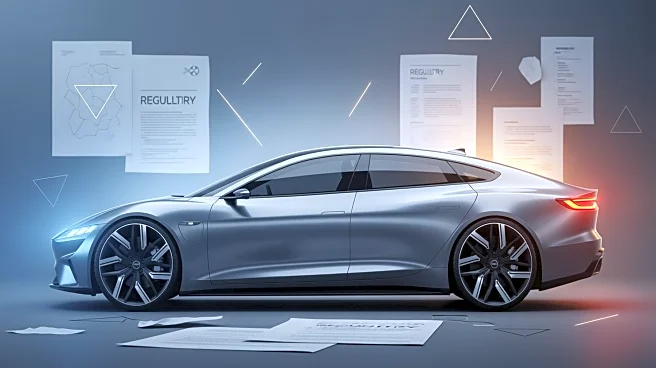What's Happening?
Tesla's stock is positioned near record highs as the company navigates a complex landscape of growth opportunities and regulatory challenges. As of November 14, 2025, Tesla shares closed at $404.35, with
a market cap of approximately $1.34 trillion. The company reported record vehicle deliveries and revenue in Q3 2025, but profits were squeezed due to increased costs and investments in AI and robotics. Tesla's ambitious growth plans include expanding its robotaxi network and deploying humanoid robots, supported by Elon Musk's $1 trillion pay package. However, regulatory scrutiny over Tesla's Full Self-Driving (FSD) system and other safety concerns pose significant risks.
Why It's Important?
Tesla's current valuation reflects high expectations for its future success in AI and robotics, beyond its core electric vehicle business. The company's ability to meet these expectations is crucial for maintaining investor confidence. Regulatory challenges, particularly concerning the FSD system, could impact Tesla's growth narrative and valuation. The company's strategic shift away from China-made parts and its focus on decarbonization initiatives are also significant as they navigate geopolitical tensions and environmental concerns. The outcome of these factors will influence Tesla's market position and its ability to sustain its high valuation.
What's Next?
Tesla faces several key questions as it moves forward. The company must address regulatory concerns regarding its FSD system to avoid potential restrictions or recalls that could hinder its robotaxi plans. Additionally, Tesla needs to stabilize its profit margins amidst tariff pressures and high investment costs. The sustainability of demand, particularly in China and the U.S., will be critical as tax credits expire and geopolitical tensions persist. Investors will closely watch Tesla's ability to execute its ambitious growth plans and maintain its valuation amidst these challenges.
Beyond the Headlines
Tesla's journey highlights broader themes in the automotive and tech industries, including the integration of AI and robotics into traditional manufacturing. The company's focus on decarbonization and sustainable energy solutions reflects a growing trend towards environmental responsibility. Tesla's strategic decisions, such as moving away from China-made parts, underscore the impact of geopolitical dynamics on global supply chains. These developments may influence industry standards and regulatory frameworks, shaping the future of transportation and technology.









